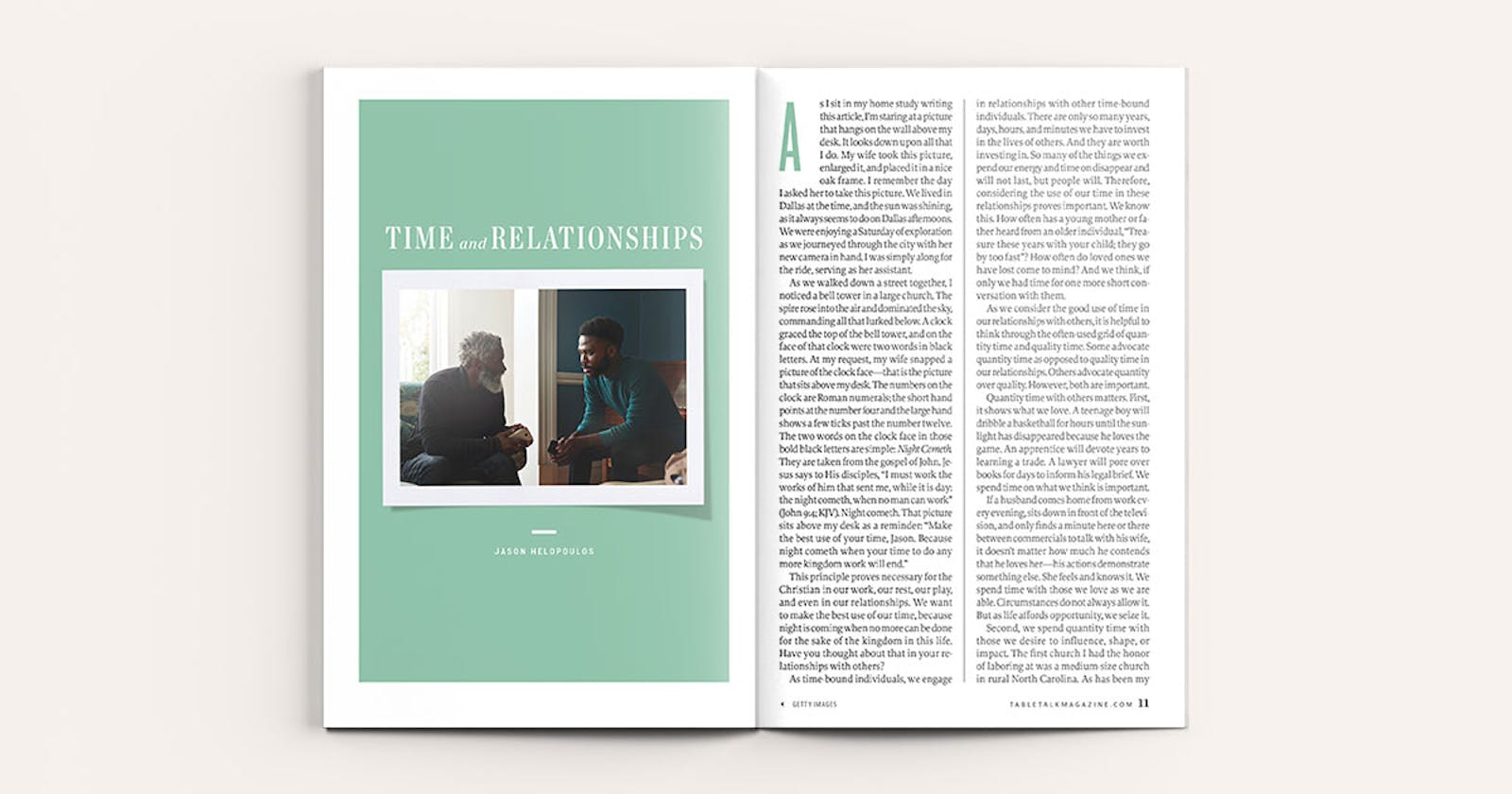
Request your free, three-month trial to Tabletalk magazine. You’ll receive the print issue monthly and gain immediate digital access to decades of archives. This trial is risk-free. No credit card required.
Try Tabletalk NowAlready receive Tabletalk magazine every month?
Verify your email address to gain unlimited access.
As I sit in my home study writing this article, I’m staring at a picture that hangs on the wall above my desk. It looks down upon all that I do. My wife took this picture, enlarged it, and placed it in a nice oak frame. I remember the day I asked her to take this picture. We lived in Dallas at the time, and the sun was shining, as it always seems to do on Dallas afternoons. We were enjoying a Saturday of exploration as we journeyed through the city with her new camera in hand. I was simply along for the ride, serving as her assistant.
As we walked down a street together, I noticed a bell tower in a large church. The spire rose into the air and dominated the sky, commanding all that lurked below. A clock graced the top of the bell tower, and on the face of that clock were two words in black letters. At my request, my wife snapped a picture of the clock face—that is the picture that sits above my desk. The numbers on the clock are Roman numerals; the short hand points at the number four and the large hand shows a few ticks past the number twelve. The two words on the clock face in those bold black letters are simple: Night Cometh. They are taken from the gospel of John. Jesus says to His disciples, “I must work the works of him that sent me, while it is day: the night cometh, when no man can work” (John 9:4; KJV). Night cometh. That picture sits above my desk as a reminder: “Make the best use of your time, Jason. Because night cometh when your time to do any more kingdom work will end.”
This principle proves necessary for the Christian in our work, our rest, our play, and even in our relationships. We want to make the best use of our time, because night is coming when no more can be done for the sake of the kingdom in this life. Have you thought about that in your relationships with others?
As time-bound individuals, we engage in relationships with other time-bound individuals. There are only so many years, days, hours, and minutes we have to invest in the lives of others. And they are worth investing in. So many of the things we expend our energy and time on disappear and will not last, but people will. Therefore, considering the use of our time in these relationships proves important. We know this. How often has a young mother or father heard from an older individual, “Treasure these years with your child; they go by too fast”? How often do loved ones we have lost come to mind? And we think, if only we had time for one more short conversation with them.
As we consider the good use of time in our relationships with others, it is helpful to think through the often-used grid of quantity time and quality time. Some advocate quantity time as opposed to quality time in our relationships. Others advocate quantity over quality. However, both are important.
Quantity time with others matters. First, it shows what we love. A teenage boy will dribble a basketball for hours until the sunlight has disappeared because he loves the game. An apprentice will devote years to learning a trade. A lawyer will pore over books for days to inform his legal brief. We spend time on what we think is important.
If a husband comes home from work every evening, sits down in front of the television, and only finds a minute here or there between commercials to talk with his wife, it doesn’t matter how much he contends that he loves her—his actions demonstrate something else. She feels and knows it. We spend time with those we love as we are able. Circumstances do not always allow it. But as life affords opportunity, we seize it.
Second, we spend quantity time with those we desire to influence, shape, or impact. The first church I had the honor of laboring at was a medium-size church in rural North Carolina. As has been my practice at every church I have attended or served, I spent the first six months seeking out the oldest members of the congregation. I find that there are few things more important than knowing the history of the church to which you belong. The past informs the present.
In my conversations, I kept hearing a particular name: Simon. Every older man in the congregation seemed unable to relay the history of the church without mentioning Simon by name. At first, I thought he must have been one of the early pastors. However, that was not the case. Everyone said the same things about Simon: he was small in stature, marked by a humble demeanor, always remained reticent to speak in public, served behind the scenes, and was considered a very “ordinary” layman.
Yet, Simon had a lasting impact on lives in that church. How? On Sundays, Simon would invite the young men of the church to his house for Lord’s Day afternoon walks. As they walked through the woods, he would talk to them about trees, plants, birds, and Christ. Hours upon hours were spent this way every Sunday. There was no particular weekly agenda, no plotting, and no preaching; just an older man spending quantity time with young men allowing opportunity for the Lord to work in His seemingly simple ways for profound ends. As I considered the elders of this church now forty years later, almost two-thirds of them pointed to the time they spent with Simon on those Sunday afternoons as the single greatest shaping spiritual influence upon their lives. Lives spent together impact one another, and that often takes time.
It is surely instructive that the Lord Jesus spent three years with the disciples before His crucifixion. He could have simply called them to Himself in the few weeks or final days leading up to His triumphal entry into Jerusalem. But something more was required. The minutes, hours, days, months, and years the disciples spent with the Lord Jesus informed all they were called to do. He instructed them not only with His words but with His life—and that took time.
Quality time also proves essential for meaningful relationships. Intentionality matters. Spending hours at the gym sitting on a workout bench watching your phone will not produce physical fitness but flabbiness. The quantity of time is diminished without the accompanying quality. As Christians, we recognize our limited amount of time to serve the Lord productively. We want more fit relationships than flabby relationships, because night cometh. Therefore, we want quality as well as quantity time in our relationships.

With unbelievers, we desire and aim to see those relationships move toward spiritual conversation. We appreciate others as image bearers of God, so our relationship with them is aimed at more than enjoying good food and a few laughs. Looking for and seizing opportunities for their eternal good shapes our interactions. And frankly, we do not know whether we have tomorrow, let alone them. Therefore, we seek to be purposeful in communicating the beauty and glory of the gospel and the free offer of salvation to them.
With our brothers and sisters in Christ, we desire to be used by the Lord to encourage their growth in Christlikeness, even as we believe they are in our lives to shape us into Christlikeness. Therefore, conversations cannot always remain at the superficial level. We want to set our minds on heavenly things together. We want to speak about the things of God, pray together, and study God’s truth together. We have been saved not only to Christ but to one another. And the way we approach our relationships with brothers and sisters in Christ speaks to how seriously we believe that truth.
With our family, we desire to see Christ exalted in our homes and life together. We believe that a Christian family means more than simply putting a plaque above our mantle that reads, “But as for me and my house, we will serve the Lord” (Josh. 24:15). Slogans are fine; living is better. We aim to see Christ as the center of our family lives. This means that some times are more valuable than others to us. Quality time spent in family worship, talking about life from a Christian perspective, praying together before bed, serving others in the body of Christ, and attending corporate worship make for moments we treasure.
And as we seek to live meaningfully with others in both quantity and quality time, we trust and hope that the Lord will work. The parable of the seed in Mark 4:26–29 is a helpful reminder in the midst of our relationships. Time well spent with others is never wasted. We can’t always immediately see what the time spent produces, but that is part of the glory of the Spirit’s work. The farmer goes out, scatters seed on the ground, and goes to sleep. That is his task. If he is looking for immediate gratification for a day’s hard work, he will find none. But when the farmer lies down to sleep, the Lord works. This is often what occurs in our relationships with others. Over time, the Lord works mightily. The endless hours or focused minutes spent in relationship with others produce a harvest “far more abundantly than all that we ask or could think” (Eph. 3:20). If the farmer turned to bed discouraged that night for lack of seeing a harvest, he would have been a fool. That isn’t how farming works. And that isn’t how relationships tend to work either. They are worth the time—both quantitative and qualitative. Let us invest rightly and then rest. The Lord is at work. We can trust that. Let us use our time wisely in relationships with others, for night cometh.
